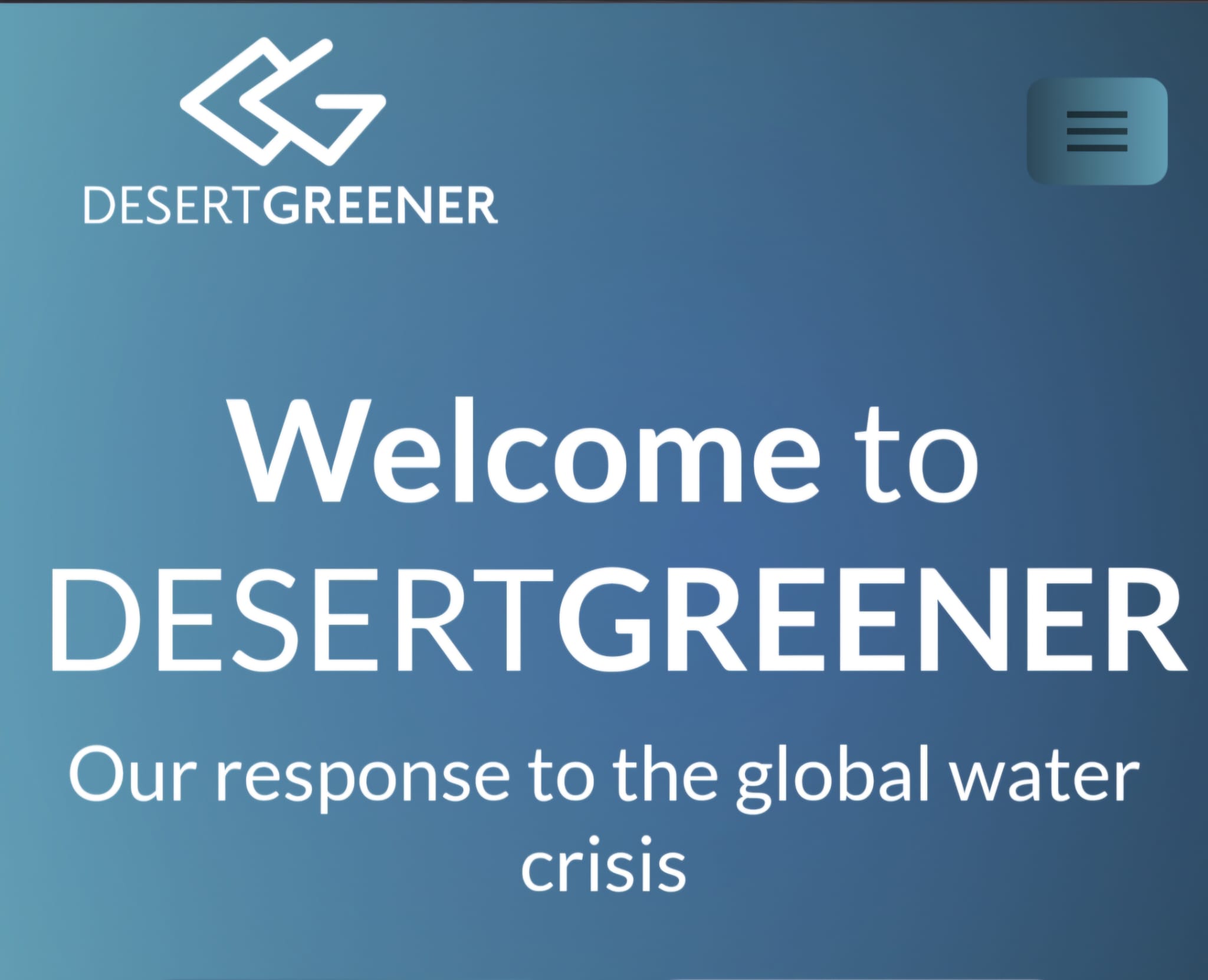Tackling Water Scarcity and Environmental Impact in the Canary Islands with a Sustainable, Scalable Solution
The Canary Islands are known for their beautiful landscapes and vibrant culture. Yet, beneath the surface of this paradise lies a serious challenge: the scarcity of drinking water. Over the years, the islands have increasingly depended on seawater desalination to meet the needs of residents and tourists alike. While desalination has provided a lifeline, it also presents significant environmental and energy challenges that highlight the urgent need for sustainable solutions.
In this post, we’ll explore the issues surrounding desalination in the Canary Islands, why water scarcity is a pressing global problem, and how the Desert Greener Project offers a transformative, sustainable solution. By leveraging renewable energy and innovative blockchain-based tokenization, Desert Greener aims to revolutionize water and land management in arid regions, creating opportunities for environmental restoration and meaningful investment.
The Canary Islands’ Water Challenge: Seawater Desalination and Its Environmental Impact
Water scarcity is one of the most pressing environmental issues of our time, affecting nearly every corner of the globe. For the Canary Islands, a region blessed with tourism but challenged by limited natural water resources, the situation is particularly critical. The islands rely heavily on desalination to meet water demands, as traditional freshwater sources like rivers and lakes are scarce or non-existent. Although seawater desalination has allowed the islands to sustain their population and thriving tourism industry, this technology comes with significant environmental and economic drawbacks.
High-Energy Consumption and Fossil Fuel Dependency
Desalination, especially through the most common process known as reverse osmosis, is extremely energy-intensive. In fact, the energy required for desalination is often five to ten times higher than that for traditional water sources. In the Canary Islands, where renewable energy integration is still developing, desalination plants are powered largely by fossil fuels. This dependency on non-renewable energy sources leads to increased carbon emissions, directly contributing to climate change. Additionally, fossil fuel reliance means water prices are subject to global oil market fluctuations, impacting both residents and businesses on the islands.
Harmful Brine Disposal and Its Impact on Marine Life
A significant byproduct of desalination is brine, a highly concentrated salt solution that, when discharged into the ocean, can have devastating effects on local marine ecosystems. The Canary Islands, with their rich biodiversity, are particularly sensitive to this impact. Increased salinity levels can disrupt marine habitats, harm sea life, and even impact the fishing industry, which many locals rely on. The waste generated from desalination also contains chemicals used in pre-treatment processes, adding to the environmental toll.
Ageing Infrastructure and High Maintenance Expenses
Many desalination facilities in the Canary Islands are decades old, requiring frequent maintenance and costly repairs. Updating these facilities to newer, more efficient models would be ideal, but the infrastructure cost is a significant barrier. This, coupled with the islands’ geographical isolation, further complicates efforts to reduce the environmental impact of desalination.
The Global Drinking Water Crisis: A Problem That Affects Us All
Water scarcity isn’t just an issue for the Canary Islands; it’s a growing global crisis. By 2025, it’s estimated that nearly two-thirds of the world’s population could face water shortages. Climate change, pollution, and population growth only exacerbate this issue, making access to clean drinking water a challenge even in historically water-rich areas. Desalination, while a necessary technology in many regions, isn’t a complete solution. The energy requirements and environmental impact associated with desalination underscore the urgent need for sustainable alternatives.
This is where Desert Greener steps in as an innovative and transformative project.
Introducing Desert Greener: A Vision for Sustainable Water and Land Management
The Desert Greener Project presents a sustainable solution to the water and land management challenges faced by the Canary Islands—and potentially, regions around the world. Designed with an environmentally conscious approach, Desert Greener combines renewable energy, advanced water management technologies, and a blockchain-based tokenization system that offers unique investment opportunities. Let’s dive into why this project is poised to make a difference for both the environment and investors.
Renewable Energy-Powered Desalination: Reducing Carbon Footprint
At the core of Desert Greener’s model is the use of renewable energy sources, primarily solar power, to fuel desalination and water purification processes. By harnessing the abundant sunshine in regions like the Canary Islands, Desert Greener can significantly cut down on fossil fuel consumption, reducing greenhouse gas emissions and aligning with global climate goals. This shift to green energy is essential for making desalination more sustainable and affordable eventually.
Advanced Desalination Technologies for Eco-Friendly Water Management
Unlike traditional desalination methods, Desert Greener explores advanced techniques like forward osmosis and electrodialysis, which consume less energy and reduce harmful byproducts. These technologies not only help conserve energy, but are also gentler on local marine environments. Moreover, Desert Greener incorporates sustainable brine disposal methods that prevent the harmful environmental effects typically associated with desalination. This approach preserves local biodiversity, a crucial step in protecting the Canary Islands' unique ecosystems.
Land Restoration and Greenery Initiatives: Transforming Arid Lands into Green Spaces
Beyond water management, Desert Greener aims to combat desertification through land restoration and greenery initiatives. Treated water is used to irrigate desert areas, creating green spaces where once there was only arid land. This transformation helps mitigate climate change by cooling down local climates, improving air quality, and increasing carbon sequestration. As desert areas are converted into vibrant green spaces, they become more resilient to environmental changes, creating habitats for biodiversity and contributing to a balanced ecosystem.
Blockchain-Based Tokenization: Investment Opportunities and Community Engagement
The Desert Greener Project introduces a revolutionary approach to funding through blockchain-based tokenization. By tokenizing the project, Desert Greener allows individuals and communities to invest directly in sustainable water and land management solutions. This decentralized funding model democratizes investment and provides steady financial backing for the project without relying solely on government subsidies.
Investors in the Desert Greener Project can receive tokenized rewards, creating a tangible incentive to support sustainable development. The tokenization model ensures transparency and aligns the project’s success with investor returns, fostering long-term engagement and commitment to environmental sustainability.
Scalability and Global Potential: A Blueprint for Arid Regions Worldwide
One of Desert Greener’s most promising aspects is its potential for scalability. The model developed for the Canary Islands could be replicated in other arid regions worldwide, from parts of Africa to the Middle East and beyond. By applying the Desert Greener approach—renewable energy, eco-friendly desalination, and land restoration—other regions can combat water scarcity and desertification while empowering communities through investment opportunities. The Desert Greener Project’s global scalability makes it a beacon of hope for areas facing severe water shortages and environmental degradation.
Why Desert Greener Is a Unique Opportunity for Investors
For investors, Desert Greener isn’t just an environmentally conscious project—it’s a meaningful and profitable opportunity. Through its blockchain-based tokenization, Desert Greener provides investors with a way to make a difference while receiving returns. By supporting Desert Greener, investors are directly contributing to sustainable water and land management, fostering environmental restoration, and helping mitigate climate change.
Take Action Today: Join the Movement for a Sustainable Future
The water scarcity crisis is real, and the environmental impact of current solutions like desalination needs urgent attention. Desert Greener offers a visionary approach that not only addresses these challenges but does so in a way that is scalable, sustainable, and profitable. By investing in Desert Greener, you’re contributing to a future where clean drinking water is accessible, ecosystems are restored, and communities thrive.
Don’t miss out on this unique opportunity to be part of a sustainable solution with global potential. Take action today and join the Desert Greener Project. Click here to learn more and become part of this Market-shifting initiative. Let’s work together to build a greener, and a more sustainable future for the Canary Islands and beyond.
Please don't hesitate to contact me for more information or to help you with the onboarding process.
I'm happy to assist you the best I can!
Greets from Tenerife, and talk soon,
Maikel D. Andres
Very Important



